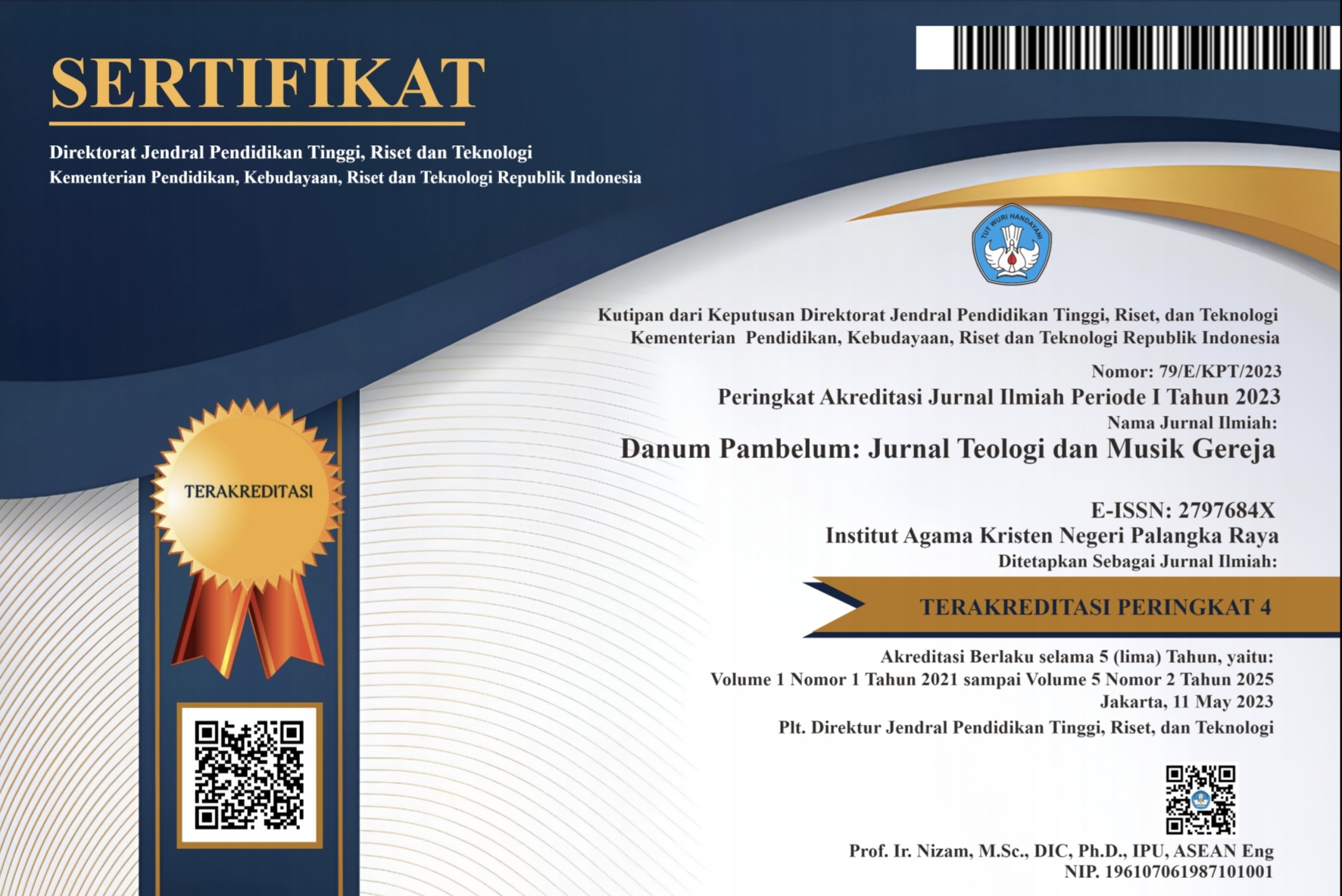Pengenalan Injil Dalam Hikmat Allah dan Hikmat Dunia Berdasarkan Teks 1 Korintus 1:18
DOI:
https://doi.org/10.54170/dp.v1i2.54Keywords:
injil, hikmat, dunia, kebinasaanAbstract
The gospel is a message of grace from God for the salvation of mankind. In the gospel, there is also the power to work out salvation in attaining the likeness and image of God. For the gospel to be delivered, humans need to know the word of God written in the gospel. The text of 1 Corinthians 1:18-25 divides knowledge of the gospel into two, namely knowledge of the gospel in the wisdom of God and knowledge of the gospel in the wisdom of the world. Both of these things are correlated with the salvation that will be received by humans. John Chrysostom said that the wisdom of the world to see the life of Jesus Christ and his resurrection is impossible. This conception creates doubt and even distrust of people which leads to the rejection of the gospel. So the denial of the lordship of Jesus Christ is the rejection of the gospel.
Injil adalah berita anugerah yang berasal dari Allah untuk keselamatan manusia. Di dalam injil juga terdapat kekuatan untuk mengerjakan keselamatan dalam mencapai keserupaan dan segambar dengan Allah. Supaya tujuan injil tersampaikan maka manusia perlu mengenal firman Allah yang tertulis di dalam injil. Teks 1 Korintus 1:18-25 membagi dua pengenalan injil, yaitu pengenalan injil dalam hikmat Allah dan pengenalan injil dalam hikmat dunia. Kedua hal ini korelasi dengan keselamatan yang akan diterima oleh manusia. John Chrysostom mengatakan bahwa hikmat dunia melihat kehidupan Yesus Kristus dan kebangkitannya merupakan sesuatu hal yang mustahil terjadi. Konsepsi ini yang menciptakan keraguan bahkan ketidakpercayaan manusia yang berujung kepada penolakan injil. Jadi penolakan akan ketuhanan Yesus Kristus adalah penolakan terhadap injil.
References
Ambrosiater. (n.d.). Catena Bible: Commentaries.
BELIEFS_of_Orthodox_Christians.pdf. (n.d.).
Chrysostom, J. (n.d.). A Selct Library Of The Nicene And Post-Nicene Fathers of the Christian Chruch: Homilies on the Epistles of Paul Tto the Corinthians. XII(T&t Clark), 17.
Fr. Trados Y. Malaty. (1993). The Apostolic Fathers. St. George’s Coptic Orthodox Chruch, 15.
Gea, I. (2018). Beritakan Injil Kepada Segala Makhluk. BIA’: Jurnal Teologi Dan Pendidikan Kristen Kontekstual, 1(1), 56–69. https://doi.org/10.34307/b.v1i1.19
Hendi. (2018). Buku Inspirasi Kalbu II (2018). 22.
Hendi. (2019). inspirasi kalbu 3. I. Maisa S, Ant, 48.
John Calvin. (1509). Commentaries On The Epistles Of Paul The Apostle To The Corinthians. I(Grand Rapids, MI: Christian Classic Ethereal Library), 52.
Kalistos ware. (1997). The Orthodox Way. Crestwood: St. Vladimir’s Seminary Press, 107.
Kusradi, S. W. (2016). LEBIH BAIK HIKMAT DARI PADA KEPERKASAAN (Suatu Study Eksegetis Pengkhotbah 9: 13-18 Dan Relevansinya Bagi Para Pemimpin Kristen). SCRIPTA: Jurnal Teologi Dan Pelayanan Kontekstual, 1(1), 64–83. https://doi.org/10.47154/scripta.v1i1.29
Lie, B. (2007). Benarkah Yesus Tidak Mati Disalib? : Sebuah Pertanggungjawaban Iman terhadap Pandangan Islam. Veritas: Jurnal Teologi Dan Pelayanan, 8(1), 83–96. https://doi.org/10.36421/veritas.v8i1.170
Manafe, Y. Y. (2016). Makna Unkapan “Jangan Hidup Lagi Sama Seperti Orang-Orang Yang Tdak Mengenal Allah Dengan Pikirannya Yang Sia-Sia” Menurut Efesus 4:17. SCRIPTA: Jurnal Teologi Dan Pelayanan Kontekstual, 2(2), 21–36. https://doi.org/10.47154/scripta.v2i2.18
Saint Chrysostom. (1889). Homilies On The Epistles Of Paul To The Corinthians. 3.
Siahaan, H. E. R. (2016). Hikmat Sebagai Implikasi Pendidikan Kristiani: Refleksi 1 Raja-raja 3:1-15. DUNAMIS: Jurnal Penelitian Teologi Dan Pendidikan Kristiani, 1(1), 15. https://doi.org/10.30648/dun.v1i1.99
Sirangki, H. (2021). Makalah Yesus Logos telaah terhadap Perspektif Yohanes VS Islam.
Susanto, Y. N. (2017). Pandangan Teologis Tentang Kehendak Bebas Manusia dan Relevansinya dengan kehidupan Orang Percaya Saat Ini. Journal of Chemical Information and Modeling, 53(9), 1689–1699.
Syafaat. (n.d.). Perbedaan Accusative dan Dative Case Dalam Grammar Bahasa Inggris”.






